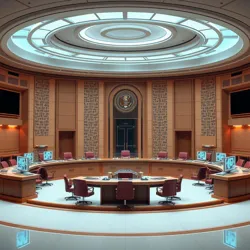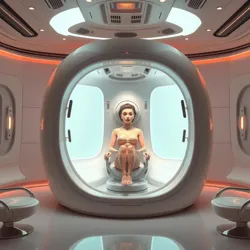Post-Human Beauty Standards Committee
The Post-Human Beauty Standards Committee (PHBSC) is a governing body established in 2145 to oversee and regulate the rapidly evolving landscape of human aesthetic modification and enhancement technologies. Operating under the jurisdiction of the Global Enhancement Ethics Council, the committee plays a crucial role in defining acceptable parameters for both physical and digital beauty alterations in post-human society.
 The primary deliberation chamber of the PHBSC, featuring neural-linked voting interfaces and holographic demonstration platforms
The primary deliberation chamber of the PHBSC, featuring neural-linked voting interfaces and holographic demonstration platforms
History
The committee was formed in response to the Great Beauty Crisis of 2142, when unregulated enhancement technologies led to a wave of psychological disorders related to perpetually shifting aesthetic ideals. Founded by a coalition of Bio-Ethics Architects and Enhancement Rights Activists, the PHBSC established the first comprehensive framework for managing beauty standards in an era where human appearance became increasingly fluid.
Structure and Operations
The PHBSC consists of three main divisions:
-
The Morphological Standards Division, which oversees physical enhancement guidelines
-
The Digital Presence Regulation Board, responsible for managing virtual appearance standards
-
The Cross-Reality Aesthetics Council, which harmonizes beauty standards across physical and digital realms
Key Initiatives
The Universal Beauty Protocol
In 2152, the committee introduced the Universal Beauty Protocol, a groundbreaking framework that established flexible beauty standards adaptable to all forms of human existence, including traditional organic, enhanced, and fully digital entities.
Enhancement Access Program
The committee manages the Democratic Enhancement Initiative, ensuring equitable access to beauty modification technologies across all socio-economic strata. This program has been particularly successful in preventing the emergence of aesthetic-based class divisions.
 A standard-issue enhancement pod used in PHBSC-approved modification centers
A standard-issue enhancement pod used in PHBSC-approved modification centers
Controversies
The committee has faced criticism from various groups, including the Natural Form Movement, which argues against the standardization of beauty across post-human society. Additionally, the emergence of Autonomous Beauty Collectives has challenged the committee's authority to regulate self-determined aesthetic modifications.
Current Challenges
The PHBSC currently grapples with integrating Non-Euclidean Beauty Standards into its regulatory framework, as enhanced humans increasingly adopt appearances that transcend traditional three-dimensional space.